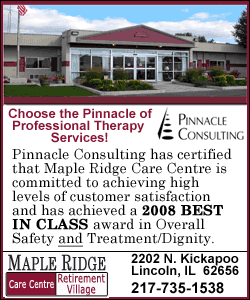|
 For years, lawmakers and the Bush administration have complained that Medicare pays much more than private insurers and the general public for medical equipment. For example, Medicare pays $1,825 for a hospital bed that can be found on the Internet for about $750, says the program's acting administrator Kerry Weems. For years, lawmakers and the Bush administration have complained that Medicare pays much more than private insurers and the general public for medical equipment. For example, Medicare pays $1,825 for a hospital bed that can be found on the Internet for about $750, says the program's acting administrator Kerry Weems.
In 2003, Congress authorized a new payment system. It determined that Medicare would quit paying a set fee that the government updates annually. Instead, local vendors would bid for Medicare's business. Five years later, that program is ready to start. It's being rolled out gradually, affecting 10 cities beginning July 1. Next year, 70 additional cities would come online.
Vendors bid so aggressively in the first round that beneficiaries in the 10 communities involved would see a savings of about 26 percent in their co-payments for medical equipment.

However, hundreds of vendors did not win a contract. Many have offered quality services for decades. They complain that Medicare rejected them for submitting insufficient financial information, but they didn't know it was insufficient until too late in the process. Another concern is that some companies who won bids have no history of serving particular communities, calling into question their capacity to serve the elderly and disabled.
Hundreds of lawmakers in the House and Senate say the program should be delayed at the very least.
"The idea is sound," said Rep. Dave Camp, R-Mich. "The implementation has been flawed."
Camp said there is bipartisan support in both the House and Senate for a delay. Camp is the ranking Republican on the House Ways and Means subcommittee dealing with health issues. The subcommittee's chairman, Rep. Pete Stark, D-Calif., also supports a delay, but also notes the industry will have to accept lower reimbursement rates.

Weems said he understands that lawmakers are hearing from a lot of medical equipment suppliers who see the program as a threat to their business. "In government, sometimes it's just hard to have losers," he said. "And I think that's the pressure being applied here."
John Reed, executive vice president of PRO2 Respiratory Services in Cincinnati, was one of those on the losing end. His company has about a quarter of the market in Cincinnati when it comes to oxygen therapy for Medicare beneficiaries. He pays about $600 for a typical oxygen concentrator. Medicare is not billed directly for the equipment, but pays him $200 a month for up to three years to deliver, setup and maintain the lifesaving device, or as much as $7,200.
Reed said the profit margin admittedly looks large: "That's the item that everybody has pointed to and says,
'Oh, this is a crime.' "
[to top of second column]
 |

But he said people also need to factor in the cost of deliveries for portable oxygen, for providing a respiratory therapist to set up the machine, for putting in place a backup system in case something goes wrong with the concentrator, for taxes, billing costs and for writing off expenses when a patient can't afford to pay all their co-payment.
"We've provided so much value-added service and care that we've put ourselves in a position to be judged by what the base unit cost," Reed said.
In Cincinnati, the selected bidding price for oxygen concentrators will be $130 a month, a 35 percent reduction from current levels. Reed said that the new system has a grandfather clause that allows him to keep his existing customers at the new rate. But he's worried about the consequences.
"As an industry, the average net income profit margin is well less than 10 percent," Reed said. "So how the Medicare program could determine that a 30 to 40 percent discount could be supported by the providers that won those bids is one of the big questions that we have."

Overall, about a quarter of the 6,200 bids in the program's first round were accepted. Weems said most of the rejected bids were too high, but the government rejected about one in five bids on grounds the company wasn't accredited or didn't provide necessary financial documentation.
The industry said such a rejection rate reveals a serious breakdown, but Weems disagreed. He also wasn't concerned that companies won even though they don't currently serve a particular community.
"That can happen anywhere, anytime under the current system," Weems said. "The competitive bidding program didn't change that at all. Instead, what we have is a circumstance where bidders that meet our accreditation standards and financial standards are willing to come into an area and offer durable medical equipment at substantially discounted rates."
About 3.6 million Medicare participants in the communities affected will soon get letters explaining the program. The cites involved are Charlotte, N.C., Cincinnati, Cleveland, Dallas, Kansas City, Mo., Miami, Orlando, Fla., Pittsburgh, Riverside, Calif., and San Juan, Puerto Rico.
___
On the Net:
Centers for Medicare and Medicaid Services
http://www.cms.hhs.gov/
[Associated
Press; By KEVIN FREKING]
Copyright 2008 The Associated
Press. All rights reserved. This material may not be published,
broadcast, rewritten or redistributed.
 |